- Home
- John le Carré
Single & Single
Single & Single Read online
PRAISE FOR SINGLE & SINGLE
“Single & Single provides a fascinating journey through the new landscape of corruption . . . The power of Single & Single stems from the author’s portrait of a world in which individuals are no match for the organized mania of greed.”
—Time
“A masterpiece . . . An adventure that takes u to the ends of the earth via the rich but often barren landscape of the human heart.”
—The Times
“Oliver Single is a wonderful le Carré creation.”
—Toronto Star
“Le Carré continues to be this century’s principle apostle of betrayal . . . a superbly skilled writer. The narrative is tautly constructed and tension is deftly created through seamless cuts between the present and flashbacks.”
—Ottawa Citizen
“Le Carré is more than just a great storyteller. In Single & Single, he captures the Zeitgeist itself, in this case the very funk of post-Soviet Euro-fear.”
—Tom Wolfe
“Events unfold with Mr. le Carré’s usual authority and aplomb . . . The reader is immersed in Oliver’s psychological drama [and] at the same time ineluctably drawn into the dizzying world of international contraband and high finance.”
—The New York Times
“[Le Carré] continues to write convincing and inventive [books] . . . His prose . . . is leaner, faster.”
—Entertainment Weekly
“It’s a story as current as this week’s headlines . . . It is le Carré’s genius to be able to take the sordid material of reality and fashion from it a redeeming and enduring entertainment.”
—The Vancouver Sun
“Brilliant . . . Le Carré’s vision is as unforgiving as Dostoevsky’s or Solzhenitsyn’s, informed by a Russian sense of mournfulness and the dooming hand of the inevitable. More than a novel, it is a warning and a lament, a last call to save what is left of the world that was once ours.”
—Edmonton Journal
“Swell writing.”
—Newsweek
“With le Carré’s superb new novel, one finds a powerfully liberated mind doing exactly what it wants . . . Complex and intricate as it is, Single & Single leaves an impression of thrilling unity. It feels, from the first page, like a violin string stretched taut, the moment before it snaps without a warning in your face.”
—Mail on Sunday
“Le Carré reveals a world at once deeply disquieting and oddly reassuring.”
—People magazine
“There is love, betrayal, bloodletting, government agencies chasing the bad guys and international intrigue—what more could you want from a le Carré novel?”
—Winnipeg Free Press
“Vintage work indeed from le Carré.”
—The Calgary Sun
“Single & Single is, like Homer’s Odyssey, the tale of a man who is trying to come home, but who faces dangers every step of the way.”
—The Record (Kitchener-Waterloo)
“Single & Single is a highly accomplished piece of work, one of le Carré’s best.”
—Evening Standard
“One of le Carré’s truly wonderful novels . . . It is a book difficult to put down, and one that you wish would never end.”
—The Leader-Post (Regina)
“Popular fiction of a high order, literate and entertaining.”
—The Province (Vancouver)
“Deprived of the great subject of Cold War espionage he handled better than any other novelist, le Carré now argues that individual greed, not ideology, is the villain to watch out for, and individual enterprise the only possible hope.”
—Kirkus Reviews
“Reading a novel by le Carré is a lot like peeling an onion from the inside out. You’re dropped into the middle of the story and from there you learn the before-and-after.”
—Book Magazine
“[A] decidedly unusual, satisfying book: literary novel and thriller combined.”
—The National Review
“The first essential of a top-rate tale of intrigue is that it catch and excite interest in the telling of its uncertain tale. And the longer it keeps readers guessing, the more intriguing it is likely to be. These two essentials are eminently satisfied by le Carré’s latest offering . . . Guaranteed to keep ennui at bay.”
—Library Journal
“Single & Single is a sign of the times.”
—The Globe and Mail
PENGUIN CANADA
SINGLE & SINGLE
JOHN LE CARRÉ was born in 1931. After attending the universities of Berne and Oxford, he spent five years in the British Foreign Service. The Spy Who Came in from the Cold, his third book, secured him a worldwide reputation. He is the author of twenty-one novels, including Tinker, Tailor, Soldier, Spy; A Perfect Spy; and The Constant Gardener. His books have been ranslated into thirty-six anguages. He lives in England.
ALSO BY JOHN LE CARRÉ
Call for the Dead
A Murder of Quality
The Spy Who Came in from the Cold
The Looking Glass War
A Small Town in Germany
The Naïve and Sentimental Lover
Tinker, Tailor, Soldier, Spy
The Honourable Schoolboy
Smiley’s People
The Little Drummer Girl
A Perfect Spy
The Russia House
The Secret Pilgrim
The Night Manager
Our Game
The Tailor of Panama
The Constant Gardener
Absolute Friends
The Mission Song
A Most Wanted Man
JOHN
LE CARRÉ
SINGLE & SINGLE
PENGUIN CANADA
Published by the Penguin Group
Penguin Group (Canada), 90 Eglinton Avenue East, Suite 700, Toronto, Ontario, Canada M4P 2Y3
(a division of Pearson Canada Inc.)
Penguin Group (USA) Inc., 375 Hudson Street, New York, New York 10014, U.S.A.
Penguin Books Ltd, 80 Strand, London WC2R 0RL, England
Penguin Ireland, 25 St Stephen’s Green, Dublin 2, Ireland
(a division of Penguin Books Ltd)
Penguin Group (Australia), 250 Camberwell Road, Camberwell, Victoria 3124, Australia
(a division of Pearson Australia Group Pty Ltd)
Penguin Books India Pvt Ltd, 11 Community Centre, Panchsheel Park, New Delhi – 110 017, India
Penguin Group (NZ), 67 Apollo Drive, Rosedale, North Shore 0632, New Zealand
(a division of Pearson New Zealand Ltd)
Penguin Books (South Africa) (Pty) Ltd, 24 Sturdee Avenue, Rosebank, Johannesburg 2196, South Africa
Penguin Books Ltd, Registered Offices: 80 Strand, London WC2R 0RL, England
First published in Viking Canada hardcover by Penguin Group (Canada), a division of Pearson Canada Inc., 1999
Published in Penguin Canada paperback by Penguin Group (Canada),
a division of Pearson Canada Inc., 2000
Published in this edition, 2009
1 2 3 4 5 6 7 8 9 10 (WEB)
Copyright © David Cornwell, 1999
All rights reserved. Without limiting the rights under copyright reserved above, no part of this publication may be reproduced, stored in or introduced into a retrieval system, or transmitted in any form or by any means (electronic, mechanical, photocopying, recording or otherwise), without the prior written permission of both the copyright owner and the above publisher of this book.
Publisher’s note: This book is a work of fiction. Names, characters, places and incidents either are the product of the author’s imagination or are used fictitiously, and any resemblance to actual persons living or dead, events
, or locales is entirely coincidental.
Manufactured in Canada.
LIBRARY AND ARCHIVES CANADA CATALOGUING IN PUBLICATION
Le Carré, John, 1931–
Single & Single/John le Carré
ISBN 978-0-14-317110-2
I. Title. II. Title: Single and Single.
PR6062.E42S47 2009 823’.914 C2009-902358-X
Except in the United States of America, this book is sold subject to the condition that it shall not, by way of trade or otherwise, be lent, re-sold, hired out, or otherwise circulated without the publisher’s prior consent in any form of binding or cover other than that in which it is published and without a similar condition including this condition being imposed on the subsequent purchaser.
Visit the Penguin Group (Canada) website at www.penguin.ca
Special and corporate bulk purchase rates available; please see
www.penguin.ca/corporatesales or call 1-800-810-3104, ext. 477 or 474
Jane’s book
Human blood is a commodity.
U.S. FEDERAL TRADE COMMISSION, 1966
1
This gun is not a gun.
Or such was Mr. Winser’s determined conviction when the youthful Alix Hoban, European managing director and chief executive of Trans-Finanz Vienna, St. Petersburg and Istanbul, introduced a pallid hand into the breast of his Italian blazer and extracted neither a platinum cigarette case nor an engraved business card, but a slim blue-black automatic pistol in mint condition, and pointed it from a distance of six inches at the bridge of Mr. Winser’s beakish but strictly nonviolent nose. This gun does not exist. It is inadmissible evidence. It is no evidence at all. It is a non-gun.
Mr. Alfred Winser was a lawyer, and to a lawyer facts were there to be challenged. All facts. The more self-evident a fact might appear to the layman, the more vigorously must the conscientious lawyer contest it. And Winser at that moment was as conscientious as the best of them. Nevertheless, he dropped his briefcase in his astonishment. He heard it fall, he felt the pressure of it linger on his palm, saw with the bottom of his eyes the shadow of it lying at his feet: my briefcase, my pen, my passport, my air tickets and travelers’ checks, my credit cards, my legality. He did not stoop to pick it up, though it had cost a fortune. He remained staring mutely at the non-gun.
This gun is not a gun. This apple is not an apple. Winser was recalling the wise words of his law tutor of forty years ago as the great man spirited a green apple from the depths of his frayed sports coat and brandished it aloft for the inspection of his mostly female audience: “It may look like an apple, ladies, it may smell like an apple, feel like an apple”—innuendo—“but does it rattle like an apple?”—shakes it—“cut like an apple?”—hauls an antique bread knife from a drawer of his desk, strikes. Apple translates into a shower of plaster. Carols of laughter as the great man kicks aside the shards with the toe of his sandal.
Winser’s reckless flight down memory lane did not stop there. From his tutor’s apple it was but a blinding flash of sunlight to his greengrocer in Hampstead, where he lived and dearly wished himself at this moment: a cheery, unarmed apple purveyor in a jolly apron and straw hat who sold, as well as apples, fine fresh asparagus that Winser’s wife, Bunny, liked, even if she didn’t like much else her husband brought her. Green, remember, Alfred, and grown above ground, never the white—pressing the shopping basket on him. And only if they’re in season, Alfred, the forced ones never taste. Why did I do it? Why do I have to marry people in order to discover I don’t like them? Why can’t I make up my mind ahead of the fact instead of after it? What is legal training for, if not to protect us from ourselves? With his terrified brain scouring every avenue of possible escape, Winser took comfort in these excursions into his internal reality. They fortified him, if only for split seconds, against the unreality of the gun.
This gun still does not exist.
But Winser couldn’t take his eyes off it. He had never seen a gun so close, never been obliged to take such intimate note of color, line, markings, burnishment and style, all perfectly pointed up for him in the glaring sunlight. Does it fire like a gun? Does it kill like a gun, extinguish like a gun, removing face and features in a shower of plaster? Bravely, he revolted against this ridiculous possibility. This gun does not, absolutely does not exist! It is a chimera, a trick of white sky, heat and sunstroke. It is a fever gun, brought on by bad food, bad marriages and two exhausting days of smoky consultations, unsettling limousine rides through sweltering, dusty, traffic-choked Istanbul, by a giddying early-morning dash in the Trans-Finanz private jet above the brown massifs of central Turkey, by a suicidal three-hour drive over switchback coast roads and hairpin bends under red-rock precipices to the world’s utter end, this arid, boulder-strewn promontory of buckthorn and broken beehives six hundred feet above the eastern Mediterranean, with the morning sun already turned to full, and Hoban’s unblinking gun—still there and still a phantasm—peering like a surgeon into my brain.
He closed his eyes. See? he told Bunny. No gun. But Bunny was bored as usual, urging him to have his pleasure and leave her in peace, so instead he addressed the Bench, a thing he hadn’t done for thirty years:
My Lord, it is my pleasant duty to advise the Court that the matter of Winser versus Hoban has been amicably resolved. Winser accepts that he was mistaken in suggesting that Hoban brandished a gun during a site conference in the southern Turkish hills. Hoban in return has provided a full and satisfactory explanation of his actions . . .
And after that, out of habit or respect, he addressed his chairman, managing director and Svengali for the last twenty years, the eponymous founder and creator of the House of Single, the one and only Tiger Single himself:
It’s Winser here, Tiger. Very well indeed, thank you, sir, and how about your good self? Delighted to hear it. Yes, I think I can say that everything is exactly as you wisely predicted, and the response to date has been entirely satisfactory. Only one small thing—water under the bridge now—not a breakpoint—our client’s man Hoban gave the impression of drawing a gun on me. Nothing in it, all a fantasy, but one does like to be forewarned . . .
Even when he opened his eyes and saw the gun exactly where it had been before, and Hoban’s childlike eyes contemplating him down its barrel, and his child’s hairless forefinger crooked round the trigger, Winser did not abandon the remnants of his legal position. Very well, this gun exists as an object, but not as a gun. It is a joke gun. An amusing, harmless, practical joke. Hoban purchased it for his small son. It is a facsimile of a gun, and Hoban, in order to introduce some light relief into what for a young man has no doubt been a lengthy and tedious negotiation, is flourishing it as a prank. Through numb lips, Winser contrived a species of jaunty smile in keeping with his newest theory.
“Well, that’s a persuasive argument, I must say, Mr. Hoban,” he declared bravely. “What do you want me to do? Waive our fee?”
But in reply he heard only a hammering of coffin makers, which he hastily converted to the clatter of builders in the little tourist port across the bay as they fixed shutters and roof tiles and pipes in a last-minute rush to make ready for the season after playing backgammon all winter. In his longing for normality, Winser savored the smells of paint stripper, blowtorches, fish cooking on charcoal, the spices of street vendors, and all the other lovely and less lovely scents of Mediterranean Turkey. Hoban barked something in Russian to his colleagues. Winser heard a scramble of feet behind him but dared not turn his head. Hands yanked his jacket from his back, others explored his body—armpits, ribs, spine, groin. Memories of more acceptable hands provided no solace as those of his assailants groped their way downward to his calves and ankles, searching for a secret weapon. Winser had never carried a weapon in his life, secret or otherwise, unless it was his cherrywood walking stick to fend off rabid dogs and sex maniacs when he was taking a turn on Hampstead Heath to admire the lady joggers.
Reluctantly he remembered Hoban’s too many hangers-on.
Seduced by the gun, he had briefly imagined it was just Hoban and himself alone here on the hilltop, face-to-face and nobody in earshot, a situation any lawyer expects to use to his advantage. He now conceded that ever since they had left Istanbul, Hoban had been attended by a gaggle of unappetizing advisers. A Signor d’Emilio and a Monsieur François had joined them on their departure from Istanbul airport, coats over their shoulders, no arms showing. Winser had cared for neither man. Two more undesirables had been waiting for them at Dalaman, equipped with their own hearse-black Land Rover and driver. From Germany, Hoban had explained, introducing the pair, though not by name. From Germany they might be, but in Winser’s hearing they spoke only Turkish and they wore the undertaker suits of country Turks on business.
More hands grabbed Winser by the hair and shoulders and flung him to his knees on the sandy track. He heard goat bells tinkling and decided they were the bells of St. John at Hampstead, tolling out his burial. Other hands took his loose change, spectacles and handkerchief. Others again picked up his treasured briefcase and he watched it as in a bad dream: his identity, his security, floating from one pair of hands to another, six hundred pounds’ worth of matchless black hide, rashly bought at Zurich airport with cash drawn from a funk-money bank account Tiger had encouraged him to open. Well, next time you’re in a generous mood, you can bloody well buy me a decent handbag, Bunny is complaining in the rising nasal whine that promises there is more to come. I’ll flit, he thought. Bunny gets Hampstead, I buy a flat in Zurich, one of those new terraces on a hillside. Tiger will understand.
Winser’s screen was suffused with a vibrant yellow wash and he let out a shriek of agony. Horned hands had seized his wrists, dragged them behind him and twisted them in opposing directions. His shriek hurtled from one hilltop to the next on its way to extinction. Kindly at first, as a dentist might, more hands raised his head, then yanked it round by the hair to meet the sun’s full blast.
“Hold it right there,” a voice ordered in English, and Winser found himself squinting up at the concerned features of Signor d’Emilio, a white-haired man of Winser’s age. Signor d’Emilio is our consultant from Naples, Hoban had said in the vile American-Russian twang that he had picked up God knew where. How very nice, Winser had replied, using Tiger’s drawl when Tiger didn’t want to be impressed, and granted him a tepid smile. Hobbled in the sand, his arms and shoulders screaming bloody murder, Winser wished very much that he had shown respect to Signor d’Emilio while he had the opportunity.

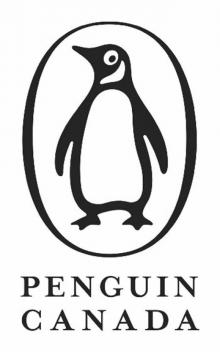 The Honorable Schoolboy
The Honorable Schoolboy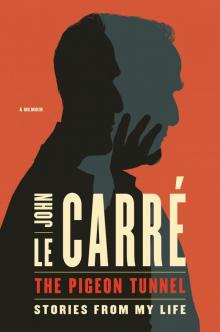 The Pigeon Tunnel: Stories From My Life
The Pigeon Tunnel: Stories From My Life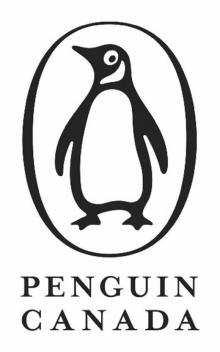 Single & Single
Single & Single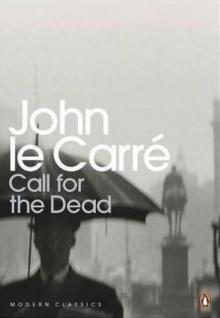 The Spy Who Came in From the Cold
The Spy Who Came in From the Cold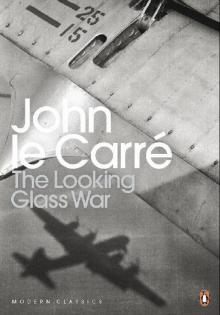 The Looking Glass War
The Looking Glass War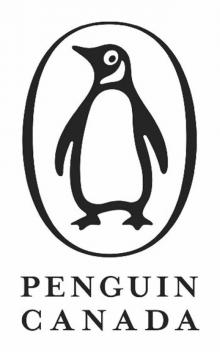 The Night Manager
The Night Manager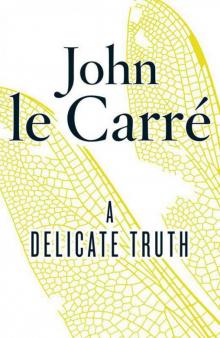 A Delicate Truth
A Delicate Truth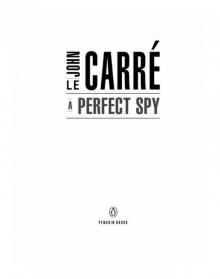 A Perfect Spy
A Perfect Spy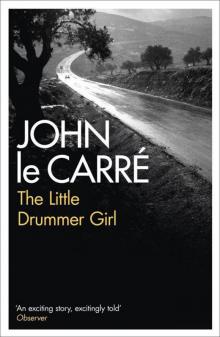 The Little Drummer Girl
The Little Drummer Girl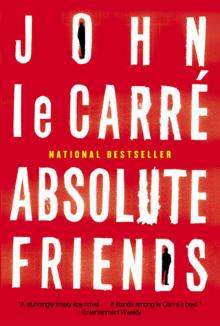 Absolute Friends
Absolute Friends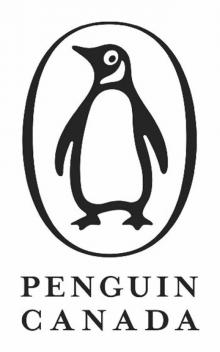 A Murder of Quality AND Call for the Dead
A Murder of Quality AND Call for the Dead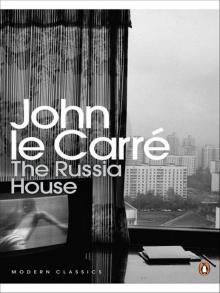 The Russia House
The Russia House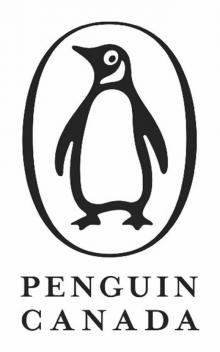 The Tailor of Panama
The Tailor of Panama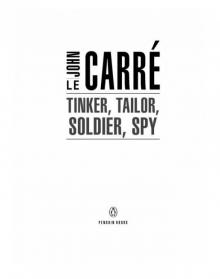 Tinker, Tailor, Soldier, Spy
Tinker, Tailor, Soldier, Spy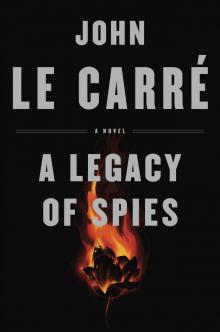 A Legacy of Spies
A Legacy of Spies The Mission Song
The Mission Song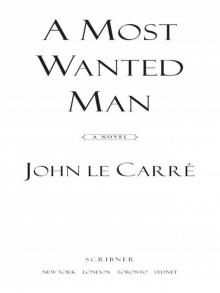 A Most Wanted Man
A Most Wanted Man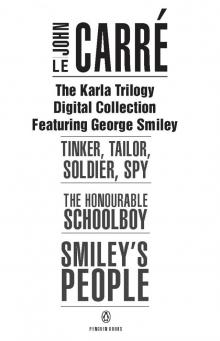 John Le Carré: Three Complete Novels
John Le Carré: Three Complete Novels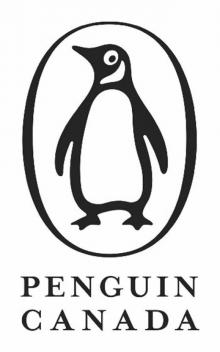 The Secret Pilgrim
The Secret Pilgrim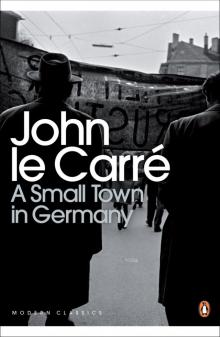 A Small Town in Germany
A Small Town in Germany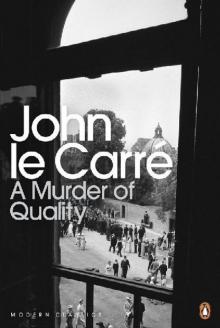 A Murder of Quality
A Murder of Quality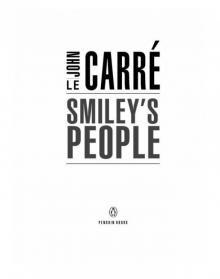 Smiley's People
Smiley's People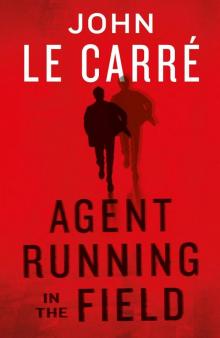 Agent Running in the Field
Agent Running in the Field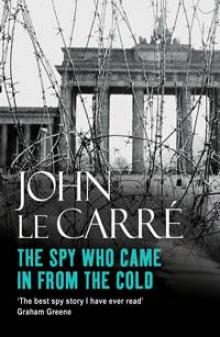 The Spy Who Came in from the Cold s-3
The Spy Who Came in from the Cold s-3 The Pigeon Tunnel
The Pigeon Tunnel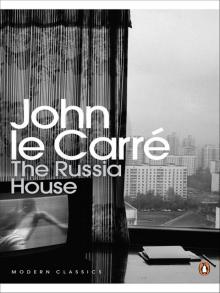 The Russia House - 13
The Russia House - 13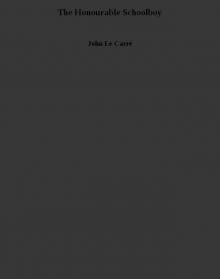 The Honourable Schoolboy
The Honourable Schoolboy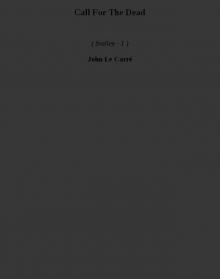 Call For The Dead s-1
Call For The Dead s-1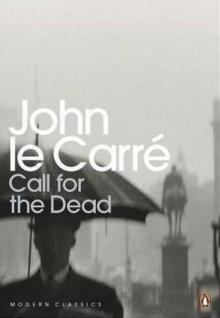 Call for the Dead
Call for the Dead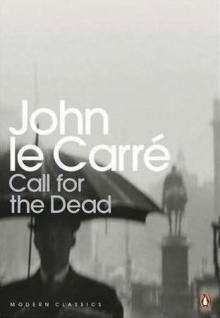 Call for the Dead - 1
Call for the Dead - 1